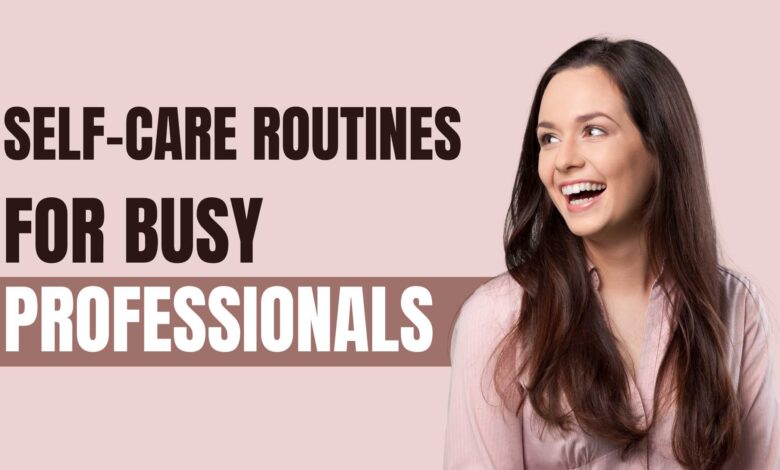10 Self-Care Routines for Busy Professionals

Self-Care: In today’s fast-paced world, busy professionals often find themselves juggling tight schedules, deadlines, and multiple responsibilities. This fast pace can lead to fatigue, stress, and decreased quality of life. To maintain physical, mental and emotional health, busy professionals must incorporate self-care into their daily lives. Here are some effective self-care strategies that can fit into the life of a busy professional.
Table of Contents
Master sleep
Sleep is an important part of self-care that is often overlooked by busy professionals. Lack of sleep can lead to decreased productivity, impaired cognitive function, and a weakened immune system. To ensure a good night’s sleep, set a bedtime and create a relaxing environment by keeping your bedroom dark, cool and quiet. Try to sleep 7-9 hours every night, and avoid using stimulants like coffee and electronic devices before bed to improve the quality of sleep.
Combine Thinking and Meditation
Mindfulness and meditation are powerful tools for managing stress and increasing mental clarity. Even a few minutes of meditation each day can help reduce anxiety and improve focus. Busy professionals can practice mindfulness by taking short moments throughout the day to take deep breaths, reflect, or do a short meditation. Apps like Headspace or Calm offer meditation that can fit into a busy schedule.
Regular Exercise
Physical activity is important for maintaining physical and mental health. Exercise releases endorphins, which improve mood and reduce stress. Busy professionals can incorporate exercise into their daily lives by scheduling high-intensity training sessions, participating in walking sessions, and using a standing desk. Even 20-30 minutes of exercise per day can have a significant impact on overall health.
Eat Food
Diet plays an important role in maintaining energy levels and overall health. Busy schedules can lead to unhealthy eating habits, such as skipping meals or relying on fast food. To ensure a balanced diet, plan and prepare balanced meals in advance, focusing on whole foods such as fruits, vegetables, lean proteins, and whole grains. Provide healthy snacks such as nuts, yogurt, or fresh fruit to avoid unhealthy foods.
Set Boundaries
Setting boundaries is important to maintaining work-life balance. Busy professionals should clearly state their work hours and stick to them whenever possible. Learn to say no to other commitments that lead to overreach and burnout. Share your boundaries with colleagues and family to ensure your personal time is respected and protected.
Do Thanks
Cultivating gratitude can improve your mental health and overall outlook on life. Taking time each day to think about the things you are grateful for will shift your focus from stress to positive things. Keep a gratitude journal and write down three things you are grateful for each day. This simple practice can improve mental health and well-being.
Stay Connected
Maintaining social connections is important for mental health. Busy professionals must make an effort to stay connected with friends, family, and colleagues. Organize regular social events, such as short coffee breaks, phone calls, or weekend get-togethers. Social support can provide a sense of belonging and reduce feelings of isolation.
Engage in Recreational Activities
Participating in fun activities and activities that make you happy and relaxed is an important part of self-care. Whether it’s reading, painting, gardening, or playing a musical instrument, make time for activities that you enjoy and that relax you. Hobbies can provide a creative outlet and relieve work stress.
Rest and Holidays
Taking breaks and vacations is very important to prevent burnout. Busy professionals need to schedule breaks throughout their workday to rest and recuperate. In addition to that, taking a vacation, even a short one, can relieve the stress of work. Use this time to step away from work and do activities that will help you relax and enjoy yourself.
Seek Professional Help When Necessary
It’s important to know when you need professional help. If stress, anxiety, or depression is overwhelming, seeking help from a counselor or therapist can be of great help with coping strategies. A mental health professional can provide guidance tailored to your specific needs and help you through difficult times.
Also Read: Fitness Tips: How to Stay Active at Home
Conclusion
For busy professionals, self-care is not a luxury, but a necessity. By scheduling sleep, memory, exercising regularly, eating healthy, setting boundaries, doing gratitude, connecting, pursuing hobbies, rest and vacations, and seeking professional help when needed, busy professionals can stay healthy and productive at work. . Adopting these self-care techniques can increase productivity, improve physical and mental health, and increase balance and fulfillment.




